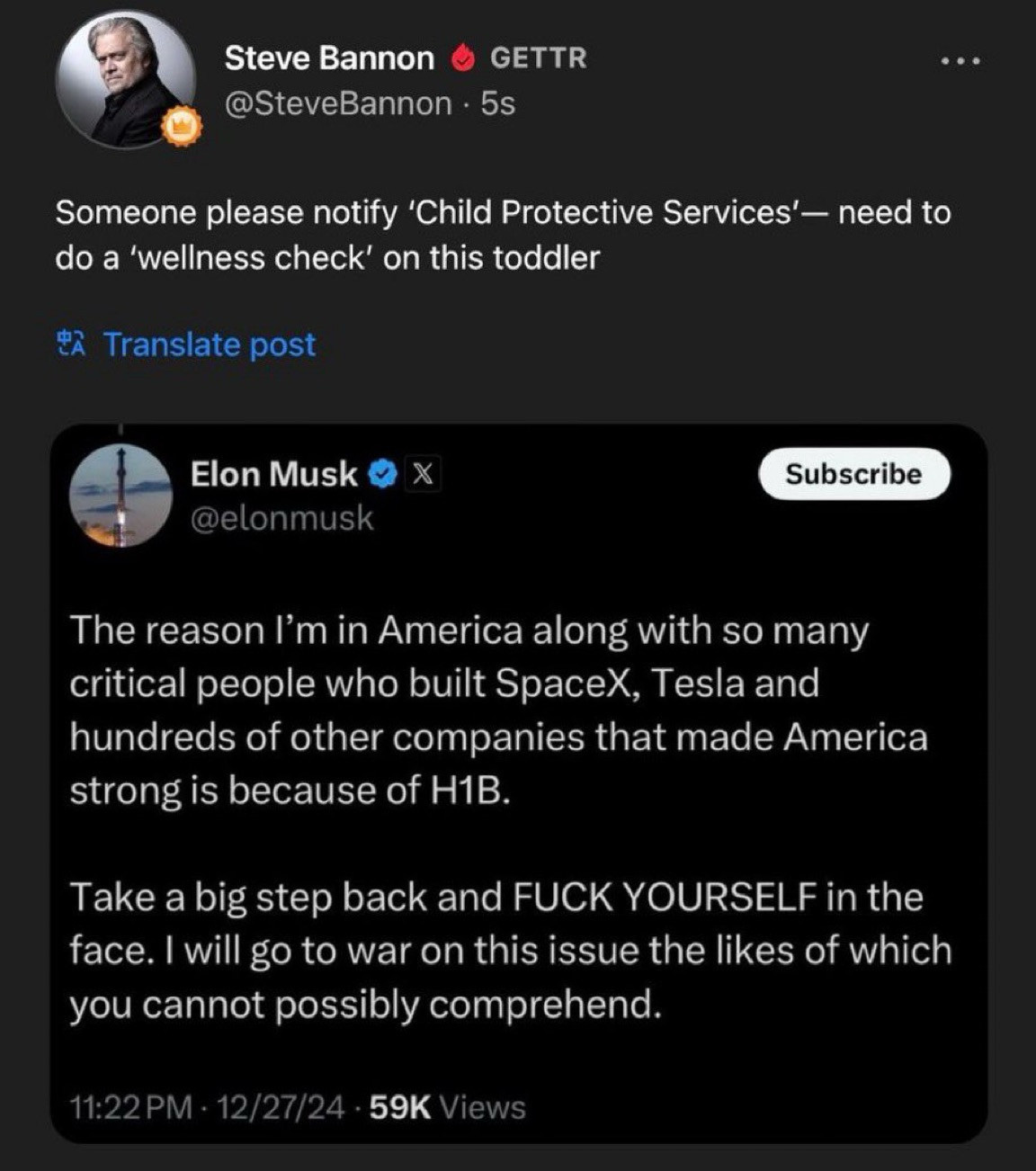The Week Ahead
December 29, 2024
Jimmy Carter passed away today at age 100. He was an imperfectly perfect human being who loved and served his country and was devoted to his wife and family. His service included being a naval officer, a senator in Georgia’s legislature, the governor of Georgia, and President of the United States, but he remained true to his roots as a peanut farmer and Sunday School teacher. The quiet humility of his post-presidential service, which included working to build houses for people who wouldn’t have them otherwise and on international public health is a lesson in service and public modesty that many of our leaders would do well to learn from. Although the country wasn’t quite ready for his leadership—his pro-environmentalist policies on energy were far ahead of the times—he was a good man and a solid leader, who I hope history will remember more kindly than his peers often have. I have a short personal reminiscence about President Carter at the bottom of this post.
On Friday, House Republicans will hold a vote to decide the next Speaker. If it was the Democrats, the media would be trotting out the “Democrats in disarray” headlines already. Perhaps there is no word that is sufficiently alliterative for Republicans—Republicans in riot is already taken from 2021. But there is chaos in the Republican Party as the infighting between the Musk/Ramaswamy branch (pro-H-1B visas that allow U.S. employers to hire foreign workers in specialty occupations) and the Loomer/Bannon faction (strict anti-immigrationists), makes it feel like the Biden presidency has evaporated and Trump is already back in power.
This alone should be a warning sign to anyone who still needs one. It's going to be a difficult four years for democracy.
There is good news, although it may be temporary, from Arkansas, where, on Christmas Eve, a federal judge struck down a law that put booksellers and librarians at risk of imprisonment if they provided minors with “harmful” material. That includes themes about race and being LGBTQ. The Judge wrote that the law tried to deputize “librarians and booksellers as the agents of censorship” and that if their decision were made in the shadow of “fear of jail time, it is likely they will shelve only books fit for young children and segregate or discard the rest.”
Holly Dickson, the executive director of the American Civil Liberties Union of Arkansas, called the law “an attempt to ‘thought police,’” and said the Judge’s decision was a “victory over totalitarianism” and “a testament to the courage of librarians, booksellers and readers who refused to bow to intimidation.” Arkansas Governor Sarah Huckabee Sanders said, “Schools and libraries shouldn’t put obscene material in front of our kids.”
It’s likely we will see an appeal to the Eighth Circuit Court of Appeals from the state as early as this week.
Book bans are up as conservatives push on these issues. Like so many other laws that aim to restrict individual liberty, book bans operate in a zone of confusion and fear that encourages people to exceed the bounds of what the law strictly requires them to do in order to protect themselves from punishment. The Arkansas law, for instance, isn’t specific about how, or to what extent librarians must go, to keep children from accessing prohibited books. So, it’s safer for a librarian to toss them out than it is to put them in an adult section because, given the vagueness of the law, they could face liability if a child wandered out of the children’s section and found the “objectionable” material elsewhere. It’s the same approach taken to create compliance with laws banning abortion where doctors and hospitals, uncertain about when they are permitted to provide care, err on the side of excessive caution. In all too many cases, these laws have the desired effect.
Then, there are people who seem unaffected by the law, even when a judge rules against them. On Friday, Rudy Giuliani will be back in court. He’s still trying to avoid paying the $148 million judgment he owes Ruby Freeman and Shaye Moss, the Georgia poll workers whose lives he disrupted by defaming them in connection with the 2020 vote count in Fulton County. Moss and Freeman’s lawyers are asking the Judge to hold Giuliani in civil contempt because he hasn’t turned over valuable items including the lease to his Manhattan apartment, a Mercedes, watches and jewelry, and baseball memorabilia that the Judge ordered him to turn over last October. In advance of the hearing, the Judge was giving off “I’ve had enough of this” vibes, so Friday’s hearing in federal court in New York could be interesting.
Giuliani’s brief is cringey: “Every human being has political beliefs, and no matter what the Court’s personal beliefs are, the Court should recognize that you have a Defendant here with an enormous judgment against him as the Plaintiffs were awarded a judgment now in excess of $145,969,000 which includes $75,000,000 in punitive damages, and this Court should recognize that Plaintiffs’ counsels are political and apparently are swayed toward the democratic party, and you have the Defendant who was a Republic Mayor and who was an attorney for former and future President Donald J. Trump, who was and is deeply rooted in republican beliefs.” It dredges up an incomprehensible reference to Hunter Biden and Burisma, before suggesting that “Plaintiffs and their counsel are seeking to take every asset of the Defendant before there is a change in administration from President Biden to President Trump.”
That, of course, is what every plaintiff who obtains a judgment tries to do, although taking the defendant’s assets has nothing to do with changes in presidential administration. Donald Trump may hold the criminal pardon power soon, but he can do nothing about a jury’s verdict in a defamation case, whether that case involves Rudy Giuliani, or even, himself.
Meanwhile, as the date for the TikTok ban in the U.S., January 19, draws closer, Donald Trump was among a number of litigants filing Amicus briefs with the Supreme Court last week. His was a little bit different than the others. It wasn’t about the law. Or even about the facts. Instead, it was about…Donald Trump.
Trump is represented by his nominee to be Solicitor General, John Sauer, who obsequiously described the president-elect in the glowing sort of terms Trump likes to see himself described with. The case is ultimately about whether U.S. companies that platform TikTok can continue to do so after the date of the ban, but apparently, Trump just wants to jump in and make a deal. There’s more than a smidge of kleptocracy underlying the idea—one wonders if even the Supreme Court will have the stomach for it.
Finally, we enter this last week of the year with real concerns about one of the essential institutions of democracy, the press. In an era of anything-goes-rampant-disinformation on social media, we need a solid backstop. When Time Magazine named Trump its “Person of the Year,” Trump vowed that he would “take on” the media again, but followed up, saying, “The media’s tamed down a little bit; they’re liking us much better now, I think.”
Let’s hope not.
The press’s job isn’t to like or dislike a president. It’s to report on what he says and does and to educate the public about what it means. Over the last few weeks, I’ve heard from so many new readers of Civil Discourse who say they’ve turned to the newsletter in their search for a reliable source for news and analysis. I want you to know I take that responsibility seriously and will always do my best for you. I’m honored by your confidence in me and committed to helping all of us navigate the difficult times ahead. If you aren’t already, I hope you’ll consider adding a paid subscription to Civil Discourse and that you’ll also share the publication with friends and family.
We’re in this together,
Joyce






The pundits can say what they want about Jimmy Carter’s time in office, but I do not think you will find a better human being than him. RIP President Jimmy Carter.
It is possible to become so wealthy that you never have to be accountable for your worth as a human being. Elon will never know that Jimmy Carter was ten times the man he will ever become.